现在完成时用法84576
现在完成时的用法和意义

现在完成时的用法和意义现在完成时是英语中的一种时态,用来表示过去发生的与现在有关的动作或状态。
在句子中,现在完成时通常由"have/has + 过去分词"构成,其中have用于第一人称和第二人称,has用于第三人称单数。
现在完成时主要有以下几种用法和意义。
1. 表示过去的动作对现在造成的影响:现在完成时可以突出过去发生的动作对现在产生的影响。
例如:- I have studied English for five years. (我学习英语已经五年了)这句话表示过去五年来一直学习英语,目前我对英语有一定的掌握程度。
2. 表示过去发生的动作对现在的结果或状态:现在完成时经常用来说明过去发生的动作对现在产生的影响或导致的结果。
例如:- She has broken her leg. (她摔断了腿)这句话说明她过去摔断了腿,现在的结果是她无法行走。
3. 表示过去的经历或经验:现在完成时也可用来表达过去的经历或经验,强调对现在的影响。
例如:- I have been to Paris twice. (我去过巴黎两次)这句话表示我过去两次去过巴黎,体验了巴黎的文化和风景。
4. 表示一个在过去开始而一直延续到现在的动作:现在完成时可以表达从过去某一时间点开始一直延续到现在的动作。
例如:- I have lived in this city since 2008. (我从2008年开始就一直住在这个城市)这句话表示我从2008年开始就一直生活在这个城市。
5. 表示刚刚完成的动作:现在完成时也可以表示刚刚完成的动作,这种用法通常与表示刚发生的时间状语连用。
例如:- She has just arrived at the airport. (她刚刚到达机场)这句话表示她刚刚到达机场,强调动作的新鲜性。
6. 表示重复或连续发生的动作:现在完成时还可以表示在过去发生的一系列重复或连续的动作,与表示频率的副词连用。
现在完成时的两种用和三个分清
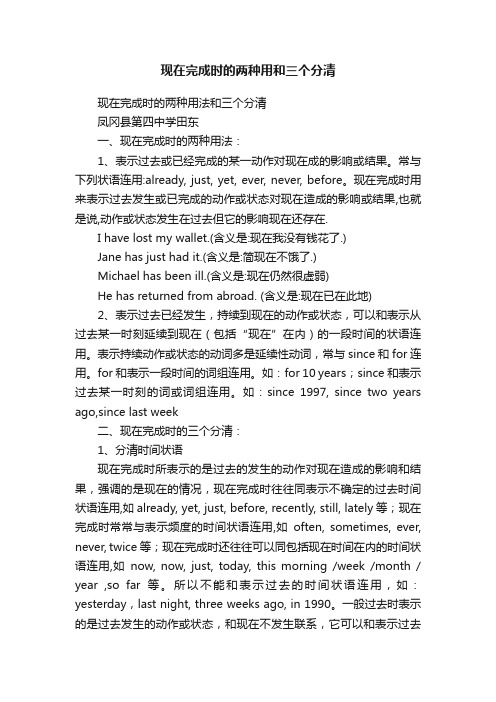
现在完成时的两种用和三个分清现在完成时的两种用法和三个分清凤冈县第四中学田东一、现在完成时的两种用法:1、表示过去或已经完成的某一动作对现在成的影响或结果。
常与下列状语连用:already, just, yet, ever, never, before。
现在完成时用来表示过去发生或已完成的动作或状态对现在造成的影响或结果,也就是说,动作或状态发生在过去但它的影响现在还存在.I have lost my wallet.(含义是:现在我没有钱花了.)Jane has just had it.(含义是:简现在不饿了.)Michael has been ill.(含义是:现在仍然很虚弱)He has returned from abroad. (含义是:现在已在此地)2、表示过去已经发生,持续到现在的动作或状态,可以和表示从过去某一时刻延续到现在(包括“现在”在内)的一段时间的状语连用。
表示持续动作或状态的动词多是延续性动词,常与since和for 连用。
for和表示一段时间的词组连用。
如:for 10 years;since和表示过去某一时刻的词或词组连用。
如:since 1997, since two years ago,since last week二、现在完成时的三个分清:1、分清时间状语现在完成时所表示的是过去的发生的动作对现在造成的影响和结果,强调的是现在的情况,现在完成时往往同表示不确定的过去时间状语连用,如already, yet, just, before, recently, still, lately等;现在完成时常常与表示频度的时间状语连用,如often, sometimes, ever, never, twice等;现在完成时还往往可以同包括现在时间在内的时间状语连用,如now, now, just, today, this morning /week /month / year ,so far等。
现在完成时的用法口诀

现在完成时的用法口诀一、现在完成时的定义和用法现在完成时是英语中一种非常重要的时态,它用来表示过去发生的动作对当前时间产生的影响或结果。
在句子中,现在完成时通常与时间状语词或短语连用,以明确动作发生的时间点或持续的时长。
下面将详细介绍现在完成时的用法,并提供一个简单易记的口诀帮助学习者掌握。
二、构成现在完成时的结构现在完成时由助动词“have/has”和动词过去分词构成。
具体构成方式如下:1. 肯定句结构:主语 + have/has + 过去分词 + 其他成分例如:- I have studied English for five years.(我已经学习英语五年了。
)- She has finished her homework.(她已经完成了家庭作业。
)2. 否定句结构:主语 + have/has + not + 过去分词 + 其他成分例如:- He has not seen the movie yet.(他还没有看过电影。
)- We haven't visited that museum before.(我们以前没有参观过那个博物馆。
)3. 疑问句结构:Have/Has + 主语 + 过去分词 + 其他成分?例如:- Have you ever been to Europe?(你去过欧洲吗?)- Has she finished her presentation?(她完成报告了吗?)三、现在完成时的用法和意义1. 表示过去到现在的经验或经历现在完成时常用来描述从过去某个时间点开始一直延续到现在的动作或状态。
这种情况下,使用程度副词或表达时间段的短语可以更加精确地说明时间长度。
例如:- I have known him since we were in high school.(我认识他自从我们还在中学时。
)- They have lived in this city for ten years.(他们在这座城市已经居住了十年。
现在完成时的用法详解英语

• Is your father in ?
•
No, heha__s_g__o_n__e__t_o___ to Shenzhen.
•
H__a__s___he everb_e_e__n__ there before ?
•
Yes, heh_a_s__b_e__e_n_____ there several times
ago.
A. Did…copy…did
B. Have…copied…have
C. Have…copied…did D. Did …copy…had
5. “Why _A_____ she _______ angry ?”
“Because he _____ at her just now .”
A. did…get…shouted B. has…got…shouted
A. Have…gone to B. Have…gone in
C. Have…been to D. Have …been in
3. My brother _C___college for over three years.
A. has gone to B. has been to C. has been at
但是不能和表示一段时间的状语连用。
短暂性动词变延续性动词:
• join --- be in / a
2) comeb-e-- in / at
• 3) borrow ---keep 4) buy -h-a-ve
5) arrive ---be
6) leave b--e- away (from)
7) begin --b- e on
• It has been colds_in__c_e__ two weeks ago.
现在完成时态用法全面总结(个人原创 绝对好用)
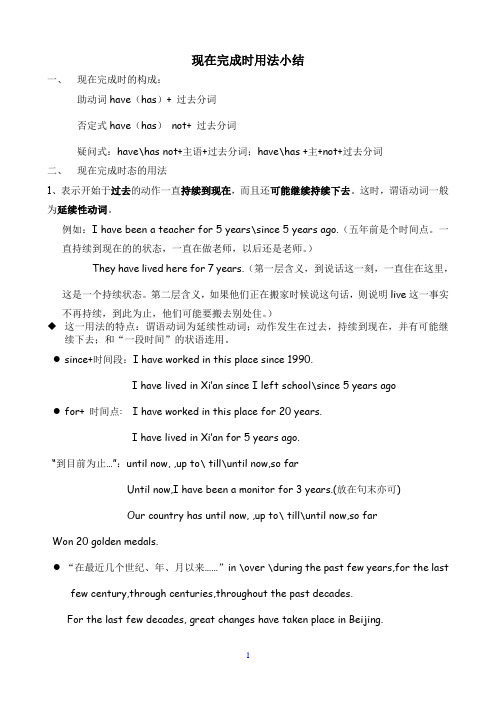
现在完成时用法小结一、现在完成时的构成:助动词have(has)+ 过去分词否定式have(has)not+ 过去分词疑问式:have\has not+主语+过去分词;have\has +主+not+过去分词二、现在完成时态的用法1、表示开始于过去的动作一直持续到现在,而且还可能继续持续下去。
这时,谓语动词一般为延续性动词。
例如:I have been a teacher for 5 years\since 5 years ago.(五年前是个时间点。
一直持续到现在的的状态,一直在做老师,以后还是老师。
)They have lived here for 7 years.(第一层含义,到说话这一刻,一直住在这里,这是一个持续状态。
第二层含义,如果他们正在搬家时候说这句话,则说明live这一事实不再持续,到此为止,他们可能要搬去别处住。
)◆这一用法的特点:谓语动词为延续性动词;动作发生在过去,持续到现在,并有可能继续下去;和“一段时间”的状语连用。
●since+时间段:I have worked in this place since 1990.I have lived in Xi’an since I left school\since 5 years ago●for+ 时间点: I have worked in this place for 20 years.I have lived in Xi’an for 5 years ago.“到目前为止…”:until now, ,up to\ till\until now,so farUntil now,I have been a monitor for 3 years.(放在句末亦可)Our country has until now, ,up to\ till\until now,so farWon 20 golden medals.●“在最近几个世纪、年、月以来……”in \over \during the past few years,for the lastfew century,through centuries,throughout the past decades.For the last few decades, great changes have taken place in Beijing.2.表示过去某时发生或完成的某一动作,谓语动词是短暂性动词(对现在造成的影响或结果)。
现在完成时的用法

一、现在完成时:1 定义:过去发生的事情对现在有影响或结果。
2现在完成时的构成:助动词have/has +P.P.(规则/不规则)否定not,疑问提前3标志词:already/yet/just/ever/never/before/for+时间段/since +过去的时间点(一)现在完成时的用法一1:表示过去发生或已经完成的某一动作对现在造成的影响或结果。
此时,常与时间副词already(已经/肯),yet(还、已经/否,疑句),just(刚刚、仅仅) ,ever(曾经),never(从不),before(以前)等连用。
1)I've already read this book. 我已经读过这本书了。
(“读”这一动作发生在过去,对现在造成的影响是“知道书中的内容”。
)2)I've washed my clothes already.我已经洗了衣服。
(洗衣服的动作已完成,其结果是“衣服冼干净了”。
)(二)现在完成时用法二2——持续性用法(肯定句,疑问句中谓语动词必须是延续性动词):表示过去已经开始,持续到现在的动作或状态。
此时常与“for +一段时间 或“since+过去的点时间或从句(从句用一般过去时)以及so far(到目前为止)等时间状语连用。
for + 段时间since +点时间实例:1)I've lived here since 1990.自从1990年以来我就住在这里。
= I've lived here since 13 years ago.= I've lived here for 13 years.= It is 13 years since I began to live here.2)I haven't seen him for three years .我三年没有看见他了。
= I haven't seen him since three years ago= I haven't seen him since 2000.= It is 3 years since I saw him last time.3)Mr Wang has worked in the factory since he came to the city .自从到这个城市以来,王先生一直在这家工厂工作。
现在完成时的用法
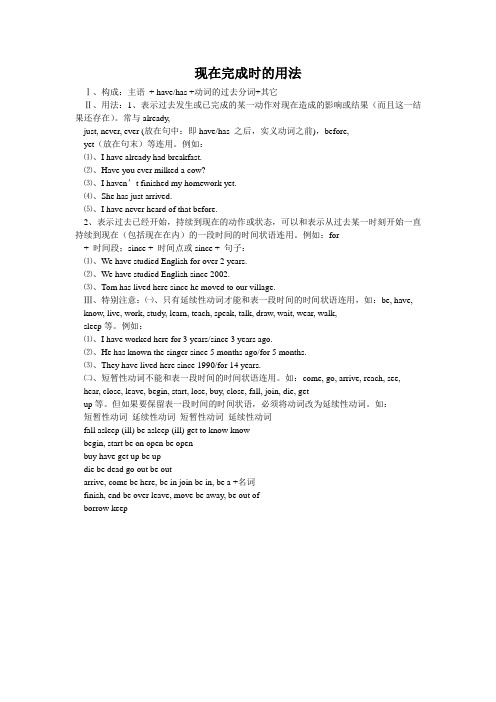
现在完成时的用法Ⅰ、构成:主语+ have/has +动词的过去分词+其它Ⅱ、用法:1、表示过去发生或已完成的某一动作对现在造成的影响或结果(而且这一结果还存在)。
常与already,just, never, ever (放在句中:即have/has 之后,实义动词之前),before,yet(放在句末)等连用。
例如:⑴、I have already had breakfast.⑵、Have you ever milked a cow?⑶、I haven’t finished my homework yet.⑷、She has just arrived.⑸、I have never heard of that before.2、表示过去已经开始,持续到现在的动作或状态,可以和表示从过去某一时刻开始一直持续到现在(包括现在在内)的一段时间的时间状语连用。
例如:for+ 时间段;since + 时间点或since + 句子:⑴、We have studied English for over 2 years.⑵、We have studied English since 2002.⑶、Tom has lived here since he moved to our village.Ⅲ、特别注意:㈠、只有延续性动词才能和表一段时间的时间状语连用,如:be, have, know, live, work, study, learn, teach, speak, talk, draw, wait, wear, walk,sleep等。
例如:⑴、I have worked here for 3 years/since 3 years ago.⑵、He has known the singer since 5 months ago/for 5 months.⑶、They have lived here since 1990/for 14 years.㈡、短暂性动词不能和表一段时间的时间状语连用。
现在完成时态的用法总结(完整汇总)

now(2000)
since+表示时间点的词或时间状语从句 for +表示时间段的词
I have been a teacher since 1995.
I have been a teacher since I came to Shenzhen. I have been a teacher for five years.
How long has she learnt how to dance?
She has learnt how to dance for five months.
She has learnt how to dance since April.
(2000.4---2000.9)
How long have you learnt English?
He has been a teacher for ten years.
He has been a teacher since 1990.
He has been a teacher since he left college in 1990.
(1990-2000)
(left college)
(2000.7—2000.9)
You have lived in Shenzhen since 1985. You have lived in Shenzhen for f;表示时间点的词或时间状语从句]
since 1985 now(2000) (for fifteen years)
1985 [for+表示一段时间的词]
Exercises. Use “since” or “ for” to fill in the blank.
现在完成时的用法

现在完成时的用法1.表示过去经验或行为的结果:I have read that book.(我读过那本书。
)She has seen the movie before.(她以前看过那部电影。
)They have been to Paris.(他们去过巴黎。
)2.表示过去段时间的持续状态,通常使用时间状语来指明具体的时间段:I have lived here for five years.(我在这里住了五年了。
)She has known him since they were in high school.(她自高中时代起就认识他了。
)3.表示过去一直持续到现在的动作或状态:I have studied English since I was a child.(我从小开始就一直在学习英语。
)He has been ill for weeks.(他生病已经好几个星期了。
)She has been waiting for you all day.(她一整天都在等你。
)4.表示过去动作的频率或次数:They have visited the museum twice.(他们参观过博物馆两次。
)5. 表示过去的动作与现在的关系,有时使用“just”或“recently”等时间状语来强调动作发生在不久以前:She has just finished her homework.(她刚刚完成作业。
He has recently returned from his trip.(他最近才从旅行中回来。
)6.表示过去发生但对现在仍有影响的动作:I have lost my keys.(我丢了我的钥匙。
)She has broken her leg.(她摔断了腿。
)需要注意的是,现在完成时强调的是过去动作与现在的关系,通常不明确具体的时间点。
在句子中常常与表示时间段的状语连用,或者用时间状语指明具体时间。
现在完成时(Thepresentperfecttense)的用法小结
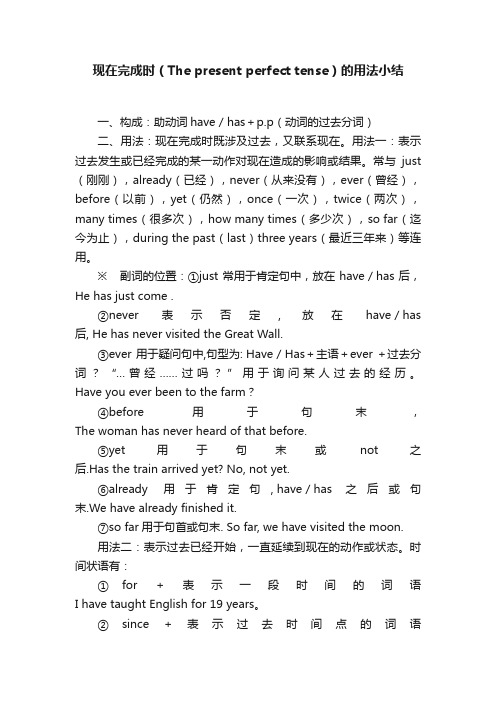
现在完成时(The present perfect tense)的用法小结一、构成:助动词have / has+p.p(动词的过去分词)二、用法:现在完成时既涉及过去,又联系现在。
用法一:表示过去发生或已经完成的某一动作对现在造成的影响或结果。
常与just (刚刚),already(已经),never(从来没有),ever(曾经),before(以前),yet(仍然),once(一次),twice(两次),many times(很多次),how many times(多少次),so far(迄今为止),during the past(last)three years(最近三年来)等连用。
※副词的位置:①just常用于肯定句中,放在have / has后,He has just come .②never表示否定, 放在have / has 后, He has never visited the Great Wall.③ever用于疑问句中,句型为: Have / Has+主语+ever +过去分词?“…曾经……过吗?”用于询问某人过去的经历。
Have you ever been to the farm?④before用于句末,The woman has never heard of that before.⑤yet用于句末或not 之后.Has the train arrived yet? No, not yet.⑥already用于肯定句, have / has 之后或句末.We have already finished it.⑦so far用于句首或句末. So far, we have visited the moon.用法二:表示过去已经开始,一直延续到现在的动作或状态。
时间状语有:① for+表示一段时间的词语I have taught English for 19 years。
② since+表示过去时间点的词语He has been at this school since 1986.③ since+表示过去的时间状语从句I have lived here since I was born.④ since+一段时间+ago. I have known him since 20 years ago.三、现在完成时态中可以和表示一段时间状语(for,since,how long, all one’s life)连用的动词必须是表示延续的情况或动作的动词,即延续性动词。
现在完成时的用法归纳
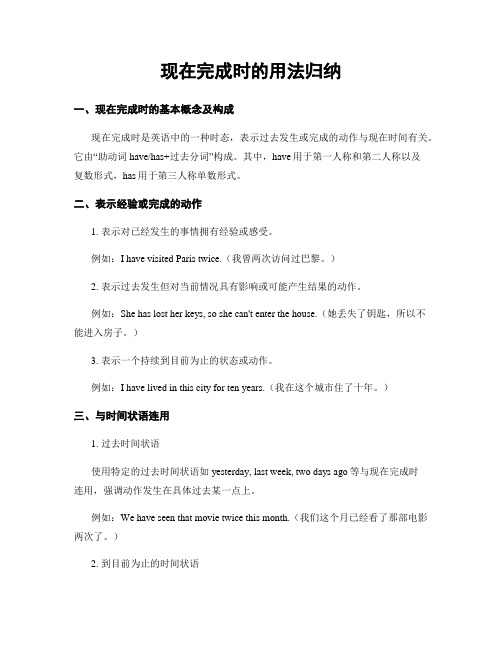
现在完成时的用法归纳一、现在完成时的基本概念及构成现在完成时是英语中的一种时态,表示过去发生或完成的动作与现在时间有关。
它由“助动词have/has+过去分词”构成。
其中,have用于第一人称和第二人称以及复数形式,has用于第三人称单数形式。
二、表示经验或完成的动作1. 表示对已经发生的事情拥有经验或感受。
例如:I have visited Paris twice.(我曾两次访问过巴黎。
)2. 表示过去发生但对当前情况具有影响或可能产生结果的动作。
例如:She has lost her keys, so she can't enter the house.(她丢失了钥匙,所以不能进入房子。
)3. 表示一个持续到目前为止的状态或动作。
例如:I have lived in this city for ten years.(我在这个城市住了十年。
)三、与时间状语连用1. 过去时间状语使用特定的过去时间状语如yesterday, last week, two days ago等与现在完成时连用,强调动作发生在具体过去某一点上。
例如:We have seen that movie twice this month.(我们这个月已经看了那部电影两次了。
)2. 到目前为止的时间状语使用含有表示到目前为止的时间段的状语如already, yet, ever等与现在完成时连用,强调动作发生在目前这一点上。
例如:Have you finished your homework yet?(你作业做完了吗?)四、与现在结果相关的动作1. 表示过去结束但对当前情况有影响的动作。
例如:I have cleaned the house, so now it looks tidy and neat.(我已经打扫了房子,所以现在它看起来整洁干净。
)2. 表示不断重复的动作或经历。
例如:She has visited China multiple times.(她多次访问过中国。
英语现在完成时的用法总结
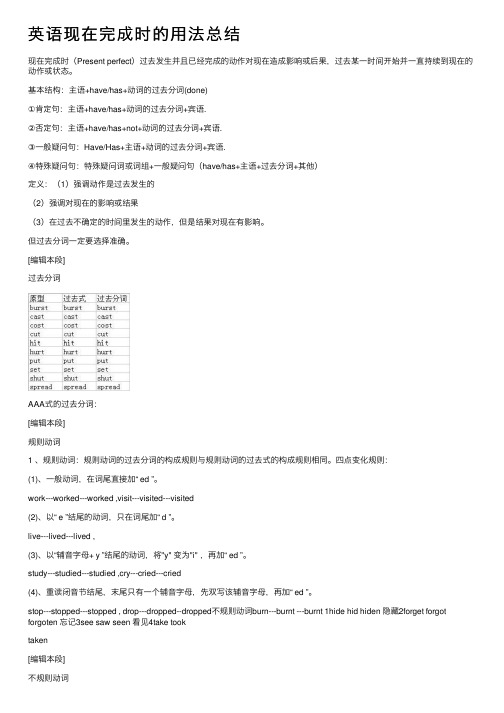
英语现在完成时的⽤法总结现在完成时(Present perfect)过去发⽣并且已经完成的动作对现在造成影响或后果,过去某⼀时间开始并⼀直持续到现在的动作或状态。
基本结构:主语+have/has+动词的过去分词(done)①肯定句:主语+have/has+动词的过去分词+宾语.②否定句:主语+have/has+not+动词的过去分词+宾语.③⼀般疑问句:Have/Has+主语+动词的过去分词+宾语.④特殊疑问句:特殊疑问词或词组+⼀般疑问句(have/has+主语+过去分词+其他)定义:(1)强调动作是过去发⽣的(2)强调对现在的影响或结果(3)在过去不确定的时间⾥发⽣的动作,但是结果对现在有影响。
但过去分词⼀定要选择准确。
[编辑本段]过去分词AAA式的过去分词:[编辑本段]规则动词1 、规则动词:规则动词的过去分词的构成规则与规则动词的过去式的构成规则相同。
四点变化规则:(1)、⼀般动词,在词尾直接加“ ed ”。
work---worked---worked ,visit---visited---visited(2)、以“ e ”结尾的动词,只在词尾加“ d ”。
live---lived---lived ,(3)、以“辅⾳字母+ y ”结尾的动词,将"y" 变为"i" ,再加“ ed ”。
study---studied---studied ,cry---cried---cried(4)、重读闭⾳节结尾,末尾只有⼀个辅⾳字母,先双写该辅⾳字母,再加“ ed ”。
stop---stopped---stopped , drop---dropped--dropped不规则动词burn---burnt ---burnt 1hide hid hiden 隐藏2forget forgot forgoten 忘记3see saw seen 看见4take tooktaken[编辑本段]不规则动词2 、不规则动词:AAA型原型过去式过去分词burst burst burstcast cast castcost cost costcut cut cuthit hit hithurt hurt hurtput put putset set setshut shut shutspread spread spreadlet let letread read readled led ledAAB型beat beat beatenABA型become became becomerun ran runcome came come特殊情况read read readread原形发⾳为/ri:d/,过去式和过去分词发⾳为/red/ ABB型bring brought broughtbuy bought boughtbuild built builtburn burnt burnt catch caught caught dig dug dug feel felt feltfight fought fought find found foundfeed fed fedget got gothang hung hunghear heard heard hold held heldkeep kept keptlay laid laidlead led ledlose lost lostleave left leftlend lent lentmake made made mean meant meant meet met metpay paid paidsell sold soldshoot shot shotsay said saidsit sat satstand stood stood shine shone shone sweep swept swept sleep slept slept teach taught taught tell told told think thought thought win won wonABC型begin began begun blow blew blown break broke broken choose chose chosendraw drew drawndrive drove drivendrink drank drunkfly flew flownforgive forgave forgivenforget forgot forgottenfreeze froze frozengive gave givengrow grew grownknow knew knownride rode riddenrise rose risenring rang rungshake shook shakensing sang sungsink sank sunkswim swam swumthrow threw thrownwrite wrote writtentake took takenwear wore worn[编辑本段]⽤法(1)现在完成时⽤来表⽰现在之前已发⽣过或完成的动作或状态,但其结果却和现在有联系,也就是说,动作或状态发⽣在过去但它的影响现在还存在.I have spent all of my money.(含义是:现在我没有钱花了.)Jane has laid the table.(含义是:现在桌⼦已经摆好了.)Michael has been ill.(含义是:现在仍然很虚弱)He has returned from abroad. (含义是:现在已在此地)(2)现在完成时可以⽤来表⽰发⽣在过去某⼀时刻的,持续到现在的动作(⽤⾏为动词表⽰)或状态(be动词表⽰)常与for(+时间段),since(+时间点或过去时的句⼦)连⽤.①for+时段②since+过去⼀个时间点(译为:⾃从……以来)③since+时段+ago④since+从句(过去时)●⑤It is+时段+since+从句(过去时)Mary has been ill for three days.I have lived here since 1998.●注:瞬间动词(buy,die,join,lose……)不能直接与for since 连⽤。
英语语法现在完成时的用法详解
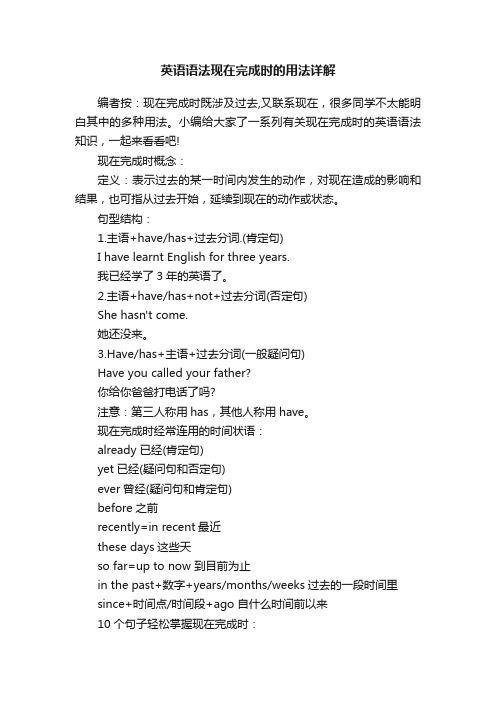
英语语法现在完成时的用法详解编者按:现在完成时既涉及过去,又联系现在,很多同学不太能明白其中的多种用法。
小编给大家了一系列有关现在完成时的英语语法知识,一起来看看吧!现在完成时概念:定义:表示过去的某一时间内发生的动作,对现在造成的影响和结果,也可指从过去开始,延续到现在的动作或状态。
句型结构:1.主语+have/has+过去分词.(肯定句)I have learnt English for three years.我已经学了3年的英语了。
2.主语+have/has+not+过去分词(否定句)She hasn't come.她还没来。
3.Have/has+主语+过去分词(一般疑问句)Have you called your father?你给你爸爸打电话了吗?注意:第三人称用has,其他人称用have。
现在完成时经常连用的时间状语:already 已经(肯定句)yet已经(疑问句和否定句)ever曾经(疑问句和肯定句)before之前recently=in recent最近these days这些天so far=up to now 到目前为止in the past+数字+years/months/weeks过去的一段时间里since+时间点/时间段+ago 自什么时间前以来10个句子轻松掌握现在完成时:Over fifty countries have joined the AIIB so far. 到目前为止,已经有50多个国家加入了亚投行。
I have finished my homework.我做完作业了。
Tom has visited the Great Wall twice.汤姆去过长城两次了。
You have already posted the letter.你已经发过信息了。
They have been to many interesting places.他们去过很多有趣的地方。
现在完成时的四种用法
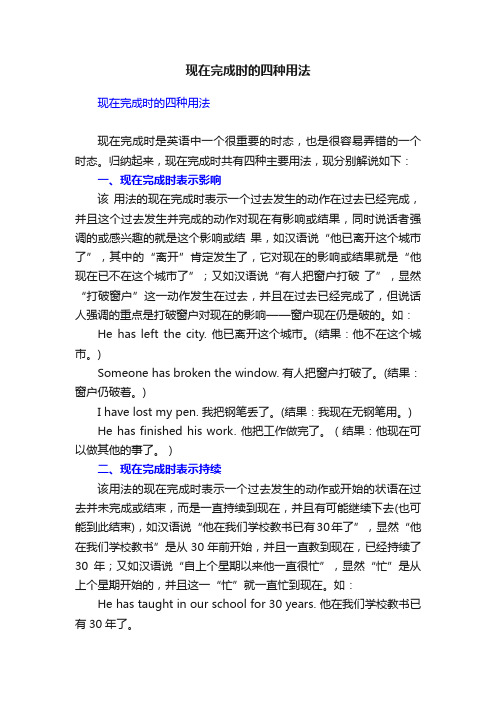
现在完成时的四种用法现在完成时的四种用法现在完成时是英语中一个很重要的时态,也是很容易弄错的一个时态。
归纳起来,现在完成时共有四种主要用法,现分别解说如下:一、现在完成时表示影响该用法的现在完成时表示一个过去发生的动作在过去已经完成,并且这个过去发生并完成的动作对现在有影响或结果,同时说话者强调的或感兴趣的就是这个影响或结果,如汉语说“他已离开这个城市了”,其中的“离开”肯定发生了,它对现在的影响或结果就是“他现在已不在这个城市了”;又如汉语说“有人把窗户打破了”,显然“打破窗户”这一动作发生在过去,并且在过去已经完成了,但说话人强调的重点是打破窗户对现在的影响——窗户现在仍是破的。
如:He has left the city. 他已离开这个城市。
(结果:他不在这个城市。
)Someone has broken the window. 有人把窗户打破了。
(结果:窗户仍破着。
)I have lost my pen. 我把钢笔丢了。
(结果:我现在无钢笔用。
)He has finished his work. 他把工作做完了。
(结果:他现在可以做其他的事了。
)二、现在完成时表示持续该用法的现在完成时表示一个过去发生的动作或开始的状语在过去并未完成或结束,而是一直持续到现在,并且有可能继续下去(也可能到此结束),如汉语说“他在我们学校教书已有30年了”,显然“他在我们学校教书”是从30年前开始,并且一直教到现在,已经持续了30年;又如汉语说“自上个星期以来他一直很忙”,显然“忙”是从上个星期开始的,并且这一“忙”就一直忙到现在。
如:He has taught in our school for 30 years. 他在我们学校教书已有30年了。
He has been busy since last week. 自上个星期以来他一直很忙。
He has worked for us ever since he left school. 他离开学校以后就一直为我们工作。
现在完成时的用法及例句
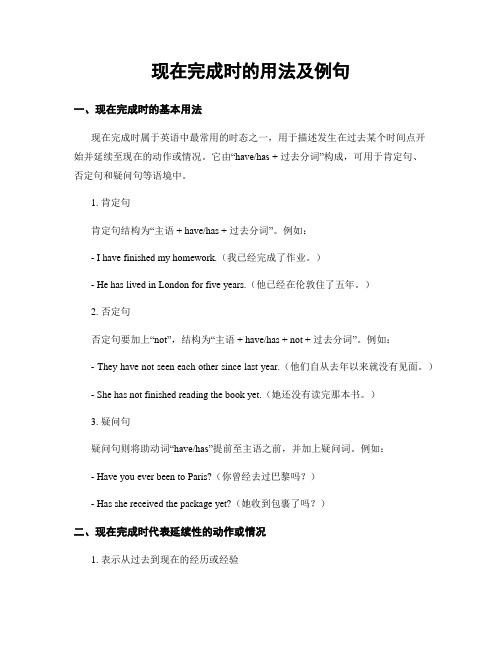
现在完成时的用法及例句一、现在完成时的基本用法现在完成时属于英语中最常用的时态之一,用于描述发生在过去某个时间点开始并延续至现在的动作或情况。
它由“have/has + 过去分词”构成,可用于肯定句、否定句和疑问句等语境中。
1. 肯定句肯定句结构为“主语 + have/has + 过去分词”。
例如:- I have finished my homework.(我已经完成了作业。
)- He has lived in London for five years.(他已经在伦敦住了五年。
)2. 否定句否定句要加上“not”,结构为“主语 + have/has + not + 过去分词”。
例如:- They have not seen each other since last year.(他们自从去年以来就没有见面。
)- She has not finished reading the book yet.(她还没有读完那本书。
)3. 疑问句疑问句则将助动词“have/has”提前至主语之前,并加上疑问词。
例如:- Have you ever been to Paris?(你曾经去过巴黎吗?)- Has she received the package yet?(她收到包裹了吗?)二、现在完成时代表延续性的动作或情况1. 表示从过去到现在的经历或经验现在完成时常用于描述一个人在过去某个时间开始并延续至今的经历或经验。
例如:- I have traveled to many countries.(我去过很多国家。
)- She has studied English since she was a child.(她从小就学习英语。
)2. 表示动作刚刚结束现在完成时也可用于表示刚刚发生、刚刚结束的动作,强调此动作对现在造成的影响。
例如:- I have just finished cooking dinner.(我刚煮完晚餐。
现在完成时的用法与变换

现在完成时的用法与变换现在完成时是英语语法中的一种时态,用于表示过去发生的动作与现在的关联。
它常常与一段已经发生的时间段相关联,或者强调过去的动作对当前情况的影响和结果。
本文将探讨现在完成时的用法,以及它的变换形式。
用法:1. 表示过去的经历或经验现在完成时常用于表达过去的经历或经验,尤其是与当前状态或情况有关的经历。
例如:- I have visited Paris twice. (我曾两次去过巴黎。
)- She has lived in New York for five years. (她在纽约居住了五年。
)2. 表示持续到现在的动作现在完成时还用于表达过去开始的动作或状态一直持续到现在。
例如:- We have known each other since childhood. (我们从小就认识彼此。
) - He has worked for this company for ten years. (他已经在这家公司工作了十年。
)3. 表示过去的动作对现在的影响现在完成时还用于强调过去的动作对现在的影响和结果。
例如:- I have lost my keys, so I can't open the door. (我把钥匙弄丢了,所以无法开门。
)- She has studied hard, and now she can speak fluent Mandarin. (她用功学习,现在能够流利地说普通话。
)变换形式:现在完成时的肯定句结构为“主语 + have/has + 过去分词”,否定句在have/has后加not,疑问句将have/has置于主语之前。
例句如下:肯定句:- I have finished my homework. (我已完成作业。
)- She has cooked dinner. (她已做好晚饭。
)否定句:- They have not seen the movie yet. (他们还没有看过那部电影。
现在完成时的用法归纳例句 (2)

现在完成时的用法归纳例句一、现在完成时的基本概念现在完成时是英语中的一种时态,用来表示过去发生的动作或事情对现在造成的影响或结果。
二、现在完成时的构成现在完成时由"have/has + 过去分词"构成。
三、现在完成时的用法归纳例句1. 表示过去延续至现在的动作或状态- I have lived in this city for 10 years.(我已经在这个城市住了10年。
)- She has known him since they were children.(她从他们还是孩子就认识他。
)2. 表示过去曾经做过的事情,强调与当前情况的联系- They have visited France twice.(他们曾经两次访问过法国。
)- He has already finished the report.(他已经完成了报告。
)3. 表示刚刚发生或刚刚结束的动作或事件- I have just arrived home.(我刚回到家。
)- The movie has just started, let's hurry up!(电影刚开始,我们快点!)4. 表示对目前为止所取得的成绩或经历- I have studied English for six years, and now I can speak fluently.(我学习英语已经六年了,现在我可以流利地说了。
)- They have worked hard and achieved great success in their business.(他们辛勤工作并在生意上取得了巨大的成功。
)5. 表示目前已完成的经验或事件,强调经验对个人成长的影响- I have traveled to many countries, which broadened my horizons.(我去过许多国家,这拓宽了我的视野。
现在完成时的用法
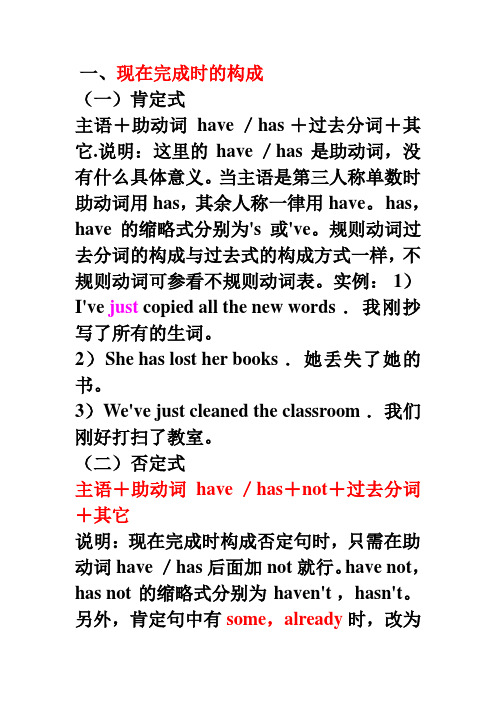
一、现在完成时的构成(一)肯定式主语+助动词have /has +过去分词+其它.说明:这里的have /has是助动词,没有什么具体意义。
当主语是第三人称单数时助动词用has,其余人称一律用have。
has,have的缩略式分别为's或've。
规则动词过去分词的构成与过去式的构成方式一样,不规则动词可参看不规则动词表。
实例: 1)I've just copied all the new words .我刚抄写了所有的生词。
2)She has lost her books .她丢失了她的书。
3)We've just cleaned the classroom .我们刚好打扫了教室。
(二)否定式主语+助动词have /has+not+过去分词+其它说明:现在完成时构成否定句时,只需在助动词have /has后面加not就行。
have not,has not的缩略式分别为haven't ,hasn't。
另外,肯定句中有some,already时,改为否定时要分别改成any,yet。
实例:1)I haven't finished my homework yet.我还没有完成我的作业。
2)She hasn't travelled on a train .她没有坐火车旅行过。
)We have never spoken to a foreigner.我们从来没有和外国人说过话。
注:有时not可以用never代替,表示“从来没有”的意思。
又如:4)I have never seen him before.以前我从来没有见过他。
(三)一般疑问式助动词Have /Has +主语+过去分词+其它 ?说明:把陈述句中的have或has放到句首,句末打问号,同时把句中的some ,already 改为any ,yet就构成了一般疑问句。
肯定回答用“Yes,主语+have/has.否定回答用“No,主语+haven't/hasn't.”有时也可以用“No,not yet./No ,never./No,not even once.”等。
- 1、下载文档前请自行甄别文档内容的完整性,平台不提供额外的编辑、内容补充、找答案等附加服务。
- 2、"仅部分预览"的文档,不可在线预览部分如存在完整性等问题,可反馈申请退款(可完整预览的文档不适用该条件!)。
- 3、如文档侵犯您的权益,请联系客服反馈,我们会尽快为您处理(人工客服工作时间:9:00-18:30)。
现在完成时(1)基本结构:肯定句: have/has+过去分词(done)+其他否定句:have+not/haven’t +过去分词(done) +其他has+not/ hasn’t+过去分词(done) +其他一般疑问句及回答:Have/Has+主语+过去分词+其他Yes, 主语+have/has.(肯定)No, 主语+haven't/hasn't.(否定)一、表示在过去不确定的时间里发生的对现在造成影响的动作或结果。
I have already spent all of my money.(含义是:现在我没有钱花了)Guo zijun has just come. (含义:郭子君现在在这儿)My father has gone to work.(含义是:我爸爸现在不在这儿)过去分词1 、规则动词:规则动词的过去分词的构成规则与规则动词的过去式的构成规则相同。
四点变化规则:(1)、一般动词,在词尾直接加“ ed ”。
work---worked---worked ,visit---visited---visited(2)、以“ e ”结尾的动词,只在词尾加“ d ”。
live---lived---lived ,(3)、以“辅音字母+ y ”结尾的动词,将 "y" 变为 "i" ,再加“ ed ”。
study---studied---studied ,cry---cried---cried(4)、重读闭音节结尾,末尾只有一个辅音字母,先双写该辅音字母,再加“ ed ”。
stop---stopped---stopped , drop---dropped--dropped2、不规则动词:do---did---done go---went---gone come---came---comehave---had---had see---saw---seen be---was/were---been句型转换:1. He has already gone home.___________________________________________ (否定句) ___________________________________________ (疑问句) ________________(肯定回答)________________(否定回答) 2. He has had lunch at home.___________________________________________ (否定句) ___________________________________________ (疑问句) ________________(肯定回答)________________(否定回答) 3. He has finished his homework. (划线提问)_____________________________________________4. I have had lunch at school. (划线提问)_____________________________________________5. I _______ told him the news.(have/has)6. She ________ come back from school.(have/has)7. He has visited the Great Wall. (划线提问)_____________________________________________8. She has studied English for many years. (划线提问)_____________________________________________9. Tom has seen the film. (划线提问)_____________________________________________10. I have washed the clothes.( 划线提问)_____________________________________________现在完成时(2)表示在过去不确定的时间里发生的对现在造成影响的动作或结果, 常与时间副词already(已经),yet(还、已经),just(刚刚、仅仅) ,ever(曾经),never (从不),before(以前)等连用。
1. already意为“已经”,通常用于肯定句中,可放在助动词之后,过去分词之前,也可以放在句末。
实例:I’ve already read this book.I’ve washed my clothes already.2. yet用在疑问句中意为“已经”,用在否定句中意为“还”,常放在句末。
实例:—Has he found his watch yet—No,not yet.The woman hasn't found her dog yet .3. just意为“刚刚”,表示行为刚刚过去,常放在助动词与过去分词之间。
实例: He has just come back from school.4. ever意为“曾经”,放在助动词与过去分词之间。
实例:Have you ever been to Hong KongI haven’t ever spoken to her.5. never意为“从来没有”常与before连用(before要放在句尾,而never多放在助动词与过去分词之间。
实例:I have never travelled by plane before.6. before意为“以前”,指过去不确定的某个时间,总是放在句末,不受句型的限制。
实例:Have you ever been to Hainan beforeI haven’t eaten Guangdong food before.把already,yet,just,ever,never,before放在句中适当的位置。
1、Jim has finished doing his homework. (already)_______________________________________________________ 2、My father has been to the Great Wall before. (never)_______________________________________________________ 3、She hasn’t seen the new film.(yet)_______________________________________________________ 4、She has been to Shanghai before.(ever)_______________________________________________________ 5. Have you found your watch(yet)_______________________________________________________ 6. ---Are you thirsty---No I have had some orange juice.(just)_______________________________________________________ 7. We have returned (return) the book.(already)_______________________________________________________ 8. I haven’t finished my homework. (yet) Can you help me_______________________________________________________ 9. My father have read the novel.(ever)_______________________________________________________’ve arrived by train.(just)_______________________________________________________不规则动词:do---_____---_____ go---_____---_____ come---_____---_____ have---_____---_____ see---_____---_____ be---_____---_____ read---read---read eat---ate---eaten speak---spoke---spoken find---found---found get---got---gotten/got win---won---won现在完成时(3)用法二:现在完成时可以用来表示发生在过去某一时刻的,持续到现在的动作或状态,常与for(+时间段),since(+时间点或过去时的句子)连用, 对for 和since引导的时间状语提问要用How longfor + 段时间since+过去一个时间点(译为:自从……以来)since+时段+agosince+句子(过去时)1) I've lived here for 16 years.I've lived here since 1990.I've lived here since 16 years ago.Mr Wang has lived in the factory since he came to the city.2) I haven't seen him for three years .我三年没有看见他了。
= I haven't seen him since 2013.= since three years ago=I haven't seen him since I saw him last time in 2013.练习A)(用for或since填空)1. He has lived in Nanjing ______ two years ago.2. I’ve known him ______ we were children.3. Our teacher has studied Japanese ______ three years.4. She has been away from the city _______ about ten years.5. It has been ten years ______ she left the city.B)(完成下列句子)1. 她在这所教学已经有五年了。
